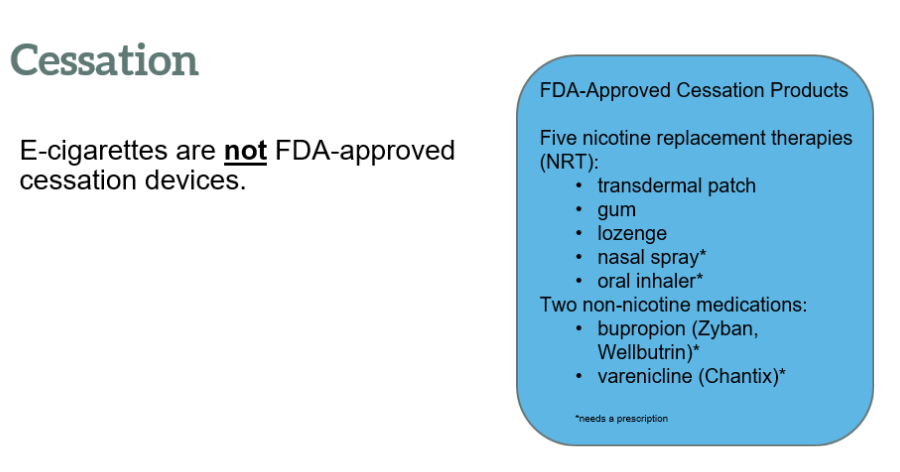Flavored Tobacco Ban
If people did not start being addicted to nicotine we would not have to address that addiction after it has become embedded. It is beyond trivial to find out information about addiction and how pernicious it is, frankly to all of us. This line from a pro-tobacco industry presentation even makes that point, "addicted individual adult smokers who still want to get access to satisfying levels of nicotine without many of the harmful effects that come with the combustion of tobacco". This makes no reference to how addictive behaviors can be pernicious in other ways and affect quality of life.
It is trivial to find information about addiction. Just recently I was listening to a podcast about what gives people pleasure and addictive behaviors. My mother was both addicted to alcohol and cigarettes, and I suspect a sister is addicted to alcohol just now, and so it is a topic of interest to me. The new theory on addiction, related to dopamine, is that we have such ready access to substances that give a dopamine hit, that we are becoming dulled by it. Whether food, shopping, romance novels, online gambling, alcohol, or tobacco products, etc., literally many things, people get a dopamine hit that no longer satisfies so they have to go to higher dosages/repetition, etc. The ability to over saturate the dopamine pathway without an associated downtime leads to increased depression, anxiety and other maladaptive behaviors.
The Paradox of Pleasure | Hidden Brain Media - All of us think we know what addiction look like. It’s the compulsive consumption of drugs, alcohol, or nicotine. But psychiatrist Anna Lembke argues that our conception of addiction is far too narrow — and that a broader understanding of addiction might help us to understand why so many people are anxious and depressed. (From Hidden Brain Media)
The conclusion of the above podcast s that addictive behaviors are reinforced most readily based on four factors. And flavored vapes hit all of them (by design from the industry). These are quantity - check, availability- check, potency - check, and novelty - check. Affect any, or all of them, and you can start to break the addiction cycle. Now of course nicotine and dopamine are not the same, but "nicotine results in the release of a variety of neurotransmitters in the brain, most importantly dopamine…Nicotine sustains tobacco addiction, a major cause of disability and premature death. Nicotine binds to nicotinic cholinergic receptors, facilitating neurotransmitter release and thereby mediating the complex actions of nicotine in tobacco users. Dopamine”
I need no more data telling me that vapes are less harmful than cigarettes. It will make no difference to me if someone finds another source to back that up. Many speakers at City Council meetings asked us to do more research between first and second reading. I did so, but if I care more about the additive behavior of nicotine and I look at the decades long history of the tobacco industry to create that addiction and continue to find new customers for their products, it is NOT going to get me into the pro-tobacco camp.
The more research I do, the more I believe that nicotine addiction is the real hook here. Discussion of tobacco and smoking are in some ways irrelevant. Re-wiring youth brains, when they are not yet fully formed, to create addiction to nicotine is inherently bad, full stop. Reduction in novelty (flavors), access (availability), potency (cutting out JUUL), and quantity hit all the right buttons for me. Quitting smoking is and always has been hard. I'm sure that years ago we could find stories from people about how patches changed their lives and helped them quit. Now we hear stories about how vaping helped people quit. But in the former case, before vapes existed, they literally had the challenge of quitting not just smoking, but nicotine addiction. Now people are quitting smoking, but remaining addicted to nicotine except in what seems to be the rare cases of dropping their dosage to 0 mg.
